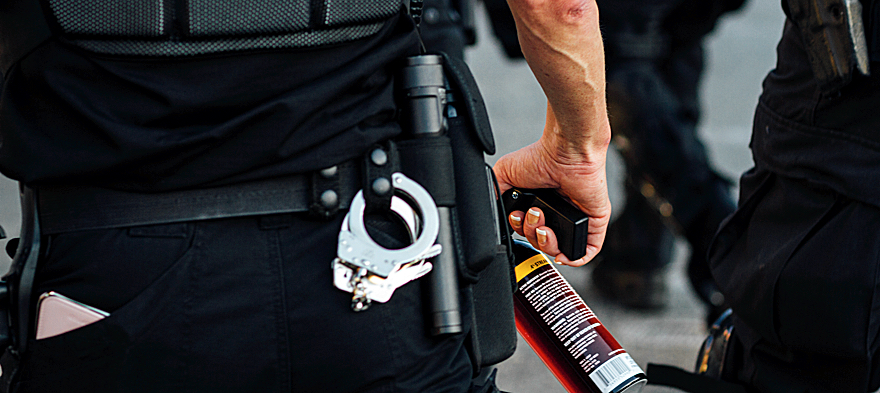
Jul 31, 2020 12:00:00 AM
I have only felt the terrible sting and discomfort of pepper spray one time, and that was when I was teaching and coaching teachers in the high school setting. The last lunch had dismissed. Students filed out of the cafeteria and were rowdy and noisy. The police officer followed the students upstairs and asked them to get to class. Since they weren’t moving quickly enough, she sprayed pepper spray into the air. That spray not only reached the students, but it also reached staff members, like me, who were monitoring the halls.
I was pissed. At first, I thought maybe a fight had happened, but it hadn’t. The students were too loud, standing in crowds in the hall and not moving fast enough during the passing period. Students came into my class angry and complaining about how the police officer’s response was not fair. We were already a day behind schedule reading “A Raisin in the Sun” by Lorraine Hansberry because our discussion was so rich that I allowed it to continue for too long the day prior. Now, we were destined to fall further behind.
Half of my room was a classroom and the other side was an office space. There wasn’t a wall to separate the spaces, so the students could see me as I was pacing to blow off some steam. A student said, “Mrs. Barnes, don’t touch your eyes. It makes it worse.” The response caught me off guard, but it shouldn’t have. [pullquote]These high school students already knew what not to do when pepper-sprayed by the police.[/pullquote]
Of course, I couldn’t pretend like the situation didn’t happen. I let students vent, and I told them I would talk to the police officer after school. There were some lively comments on what I should tell her … too lively for this post. After I reminded students of the type of language we should use, we got back to reading Hansberry.
After school, the police officer appeared annoyed that I followed up with her. I expressed how the spray got to me as well as the students. She said, “The students should have complied.”
This is why there has to be a conversation about the role of school police officers in schools. Would a police officer in the suburbs spray the hallway with pepper spray during the passing period to get students to move along? I think not. During my career, I have seen students put into handcuffs and into cop cars. I have had the police come to my classroom to get a student. Not because I called them, but because the police were following up on a situation that happened prior to my class.
When I think about my own sons, I don’t want the police to be the armed muscle of teachers to get my children under control. [pullquote]If I don’t want that for my children, I certainly don’t want that for my students.[/pullquote] My current school does not have a police officer on campus, and I feel good about that. A recent Chalkbeat article summarized various studies on school police. The closing paragraph caught my attention.
A recent study found that police in predominantly Black schools were more likely to view students in those schools as a threat. 'These findings help explain how SROs’ perceptions might expose students of color to more frequent and intense police interactions,' the researchers concluded.
Being an educator is tough enough. Educators don’t need the extra emotional trauma of seeing students hauled away by police or even getting caught up in pepper spray by the police. If people are insisting that school resource officers are necessary, then I wonder if we are operating schools or mini-prisons.
Shawnta (Shawn-tay) S. Barnes, also known as Educator Barnes, is a married mother of identical twin boys. She navigates education from not only the educator’s perspective but also the parent’s perspective. She has been an educator for nearly two decades. Shawnta works with K-12 schools, universities, & education adjacent organizations through her education consulting business Blazing Brilliance. She is an adjunct college professor, supervises student teachers, Indy Kids Winning Editor-in-Chief, Brave Brothers Books Co-founder, & CEO, and Brazen Education Podcast host. She holds five education licenses: English/language arts 5-12, English to speakers of other languages P-12, library/media P-12, reading P-12, and school administration P-12, and she has held a job in every licensed area. Previously, she has served as a school administrator, English teacher, English learners teacher, literacy coach, and librarian. She won the 2019 Indiana Black Expo Excellence in Education Journalism Award. In 2023, she completed her doctorate in Literacy, Culture, and Language Education with a minor in Learning Sciences. She is an urban gardener in her spare time and writes about her harvest-to-table journey at gardenershicole.com. To learn more about Shawnta, visit educatorbarnes.com.
The story you tell yourself about your own math ability tends to become true. This isn’t some Oprah aphorism about attracting what you want from the universe. Well, I guess it kind of is, but...
If you have a child with disabilities, you’re not alone: According to the latest data, over 7 million American schoolchildren — 14% of all students ages 3-21 — are classified as eligible for special...
The fight for educational equity has never been just about schools. The real North Star for this work is providing opportunities for each child to thrive into adulthood. This means that our advocacy...
Your donations support the voices who challenge decision makers to provide the learning opportunities all children need to thrive.
Ed Post is the flagship website platform of brightbeam, a 501(c3) network of education activists and influencers demanding a better education and a brighter future for every child.
© 2020–2024 brightbeam. All rights reserved.
Leave a Comment